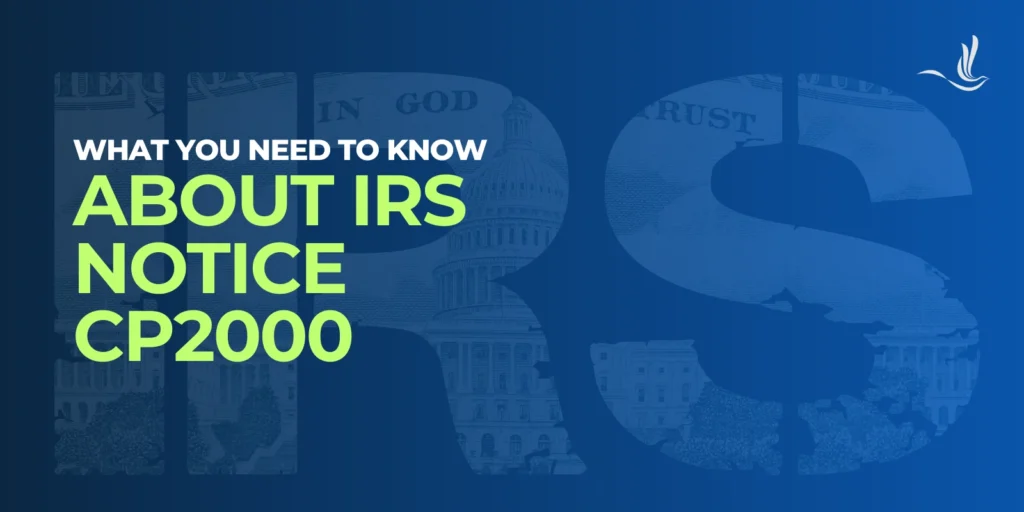What You Need to Know About IRS Notice CP2000

Receiving a notice from the IRS can be anxiety-inducing for anyone. Among the various notices the IRS sends, Notice CP2000 stands out as one that often causes confusion and concern among taxpayers. However, understanding what Notice CP2000 entails and how to respond to it is crucial for resolving any discrepancies with your tax return. In this article, we’ll delve into the specifics of IRS Notice CP2000 and provide guidance on how to address it.
What is IRS Notice CP2000?
IRS Notice CP2000 is formally titled the “Notice of Proposed Adjustment for Underpayment/Overpayment.” It is sent when the IRS identifies a discrepancy between the income, payments, and credits reported on your tax return and the information reported to the IRS by third parties, such as employers, banks, or financial institutions. The notice typically outlines the proposed changes to your tax return and explains the adjustments the IRS believes are necessary.
Why Did You Receive Notice CP2000?
There are various reasons why you might receive Notice CP2000. Common discrepancies that trigger this notice include:
- Underreported income: The IRS has information indicating you received income that was not reported on your tax return.
- Overstated deductions or credits: The deductions or credits claimed on your tax return exceed what the IRS expects based on the information provided by third parties.
- Mismatched taxpayer information: Discrepancies in taxpayer identification numbers, filing status, or other key information can also prompt the issuance of Notice CP2000.
How to Respond to Notice CP2000
Receiving Notice CP2000 does not necessarily mean you are being audited. It is essentially a proposal for adjustments to your tax return based on the IRS’s records. Here’s what you should do if you receive this notice:
Review the Notice Carefully
Take the time to thoroughly read through the notice and understand the proposed changes to your tax return. Pay close attention to the specific items that the IRS is questioning.
Compare with Your Records
Compare the information provided in Notice CP2000 with your own records, including W-2s, 1099s, and other relevant documents. Verify whether the discrepancies identified by the IRS are accurate.
Respond by the Deadline
Notice CP2000 includes a response deadline. It’s essential to adhere to this deadline to avoid further penalties or interest. You have the option to agree with the proposed changes, partially agree, or disagree entirely. If you agree, you should send the notice back to the IRS with the payment they are requesting. If you partially agree or completely disagree with the notice, you should respond pleading your case. Do not amend your tax return.
Provide Supporting Documentation
If you disagree with the proposed adjustments, you must provide supporting documentation to substantiate your position. This may include bank statements, receipts, or other evidence to support your tax return.
Await the IRS’s Response
It usually takes the IRS anywhere from 4 to 8 weeks to respond, so be patient. If the IRS rejects your response, you can submit an appeal.
Seek Professional Assistance
If you’re uncertain about how to respond to Notice CP2000 or need assistance in resolving the discrepancies, consider consulting a tax professional or accountant for guidance. Be prepared to show them your notice, any responses you’ve submitted, copies of your tax returns, and proof of eligibility for deductions and credits.
Tax Help for Those Who Receive IRS Notice CP2000
Receiving IRS Notice CP2000 can be unsettling, but it’s essential to address it promptly and accurately. By understanding the reasons behind the notice and following the appropriate steps to respond, you can effectively resolve any discrepancies with your tax return. Remember to carefully review the notice, compare it with your records, and provide supporting documentation as needed. Seeking professional assistance may also be beneficial in navigating the process and ensuring compliance with IRS requirements. Optima Tax Relief is the nation’s leading tax resolution firm with over $1 billion in resolved tax liabilities.
If You Need Tax Help, Contact Us Today for a Free Consultation